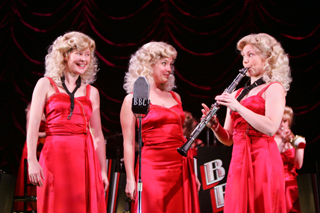August 6, 2007
In 1994 the most successful all-female pop group in history was formed: the Spice Girls. The group coined the phrase ‘Girl Power’, promoting it is a slogan representing strong, loyal friendship amongst females. The group was considered to be innovative; taking the power of female solidarity to a new level and broadcasting their manufactured opinion to female counterparts across the globe.
There never was an all-woman band called the ‘Blonde Bombshells'; however, there were women throughout Britain who during the 30s and 40s had great musical ability and due to the conditions of World War II had the opportunity to pull together and use their talent to unite, entertain and perhaps demonstrate an all together more genuine Girl Power than Posh, Ginger, the Mels and Baby.
Blonde Bombshells of 1943 by Alan Plater is a gentle fusion of comedy and music. The cast comprises seven women and one man; all of who are multitalented, often with skills stretching from being able to rattle off a melody with a trombone to delivering a quick cheesy quip in the midst of an air raid. The play endeavours to recount a day in 1943 when the ‘Blonde Bombshells’ are due to perform live on the BBC and three new band members – a school girl, a nun and an upper-class tart – are urgently recruited for the performance. The characterization is neat – nearly crass, and the play makes no attempt to hide this with one character commenting, ‘if you three went into a bar it would be like the start of a joke’.
The musical performances are varied – including pieces by George Formby, Glenn Miller and The Andrews Sisters – and are often touching but always strong. Around the songs the script appeared sometimes odd – drifting from somewhat corny lines to pontificating on the ethics of entertainment in wartime. There was also an uncomfortable scene where the band manager purports that a life in show business saved her from the comparatively awful life of nappy changing, cooking and cleaning – this to me tainted the otherwise positive portrayals of womanhood projected throughout the play.
The final scene of the show is dazzling, with the women – and the man – dressed in glitzy red dresses and big-hair blonde wigs, belting out energetic numbers and characters slickly swapping instruments and rotating round the vivaciously lit stage – real Girl Power.
Blonde Bombshells is good fun; there are moments where it attempts to address serious themes and possibly an important message is conveyed. Whatever the ethics, the play was a cheerful blend of sentiment, nostalgia and powerful female talent.
There never was an all-woman band called the ‘Blonde Bombshells'; however, there were women throughout Britain who during the 30s and 40s had great musical ability and due to the conditions of World War II had the opportunity to pull together and use their talent to unite, entertain and perhaps demonstrate an all together more genuine Girl Power than Posh, Ginger, the Mels and Baby.
Blonde Bombshells of 1943 by Alan Plater is a gentle fusion of comedy and music. The cast comprises seven women and one man; all of who are multitalented, often with skills stretching from being able to rattle off a melody with a trombone to delivering a quick cheesy quip in the midst of an air raid. The play endeavours to recount a day in 1943 when the ‘Blonde Bombshells’ are due to perform live on the BBC and three new band members – a school girl, a nun and an upper-class tart – are urgently recruited for the performance. The characterization is neat – nearly crass, and the play makes no attempt to hide this with one character commenting, ‘if you three went into a bar it would be like the start of a joke’.
The musical performances are varied – including pieces by George Formby, Glenn Miller and The Andrews Sisters – and are often touching but always strong. Around the songs the script appeared sometimes odd – drifting from somewhat corny lines to pontificating on the ethics of entertainment in wartime. There was also an uncomfortable scene where the band manager purports that a life in show business saved her from the comparatively awful life of nappy changing, cooking and cleaning – this to me tainted the otherwise positive portrayals of womanhood projected throughout the play.
The final scene of the show is dazzling, with the women – and the man – dressed in glitzy red dresses and big-hair blonde wigs, belting out energetic numbers and characters slickly swapping instruments and rotating round the vivaciously lit stage – real Girl Power.
Blonde Bombshells is good fun; there are moments where it attempts to address serious themes and possibly an important message is conveyed. Whatever the ethics, the play was a cheerful blend of sentiment, nostalgia and powerful female talent.




